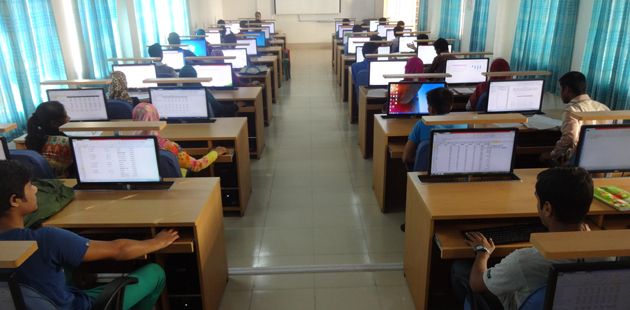
The United Nations designated July 15th as World Youth Skills Day (WYSD). The theme of this year’s WYSD is "Learning to learn for life and work”. The active engagement of youth in sustainable development efforts is critical to achieving sustainable development and stable societies. However, the challenges are many for today’s youth.
There are about 1.2 billion young people aged between 15-24 in the world today. But opportunities are limited for them. According to the UN, “young people are almost three times more likely to be unemployed than adults and continuously exposed to lower quality of jobs, greater labor market inequalities, and longer and more insecure school-to-work transitions” and “at least 475 million new jobs need to be created over the next decade to absorb the 73 million youth currently unemployed and the 40 million new annual entrants to the labor market.”
The WYSD helps highlight the current rising unemployment among youth and the importance of skill development in providing youth with opportunities.
Rising youth unemployment continues to be a major challenge for Bangladesh. Among various other reasons, the skill gap remains a key barrier to employment for the vast majority of young people in Bangladesh. A host of organizations are working to address the skill mismatch in the market. While various private and government institutions along with NGOs have been playing a key role in the skill development space, a new breed of digital platforms such as urban jobs and career marketplace Kormo, 10 Minute School, REPTO, Shinkhbe Shobai, Future Startup etc. are playing an increasingly important role in addressing the skills gap in the market. While these online platforms are relatively in their early stages, they are showing great potential for scaling up the solutions and taking it to millions of youth across the country with the power of the internet.
These platforms are offering a host of products and services targeting the young population. Some of them offer free online lessons on various topics, others offer paid courses and certifications on in-demand skills, while others connect job seekers with employers with a skill and career development component attached - as is the case with platforms like Kormo.
Kormo, which is primarily a jobs and career marketplace for urban jobs, has gone big into the skill development space over the past few months. The platform’s learn tab has helped hundreds of job seekers prepare themselves for various jobs.
Kormo has a particular advantage when it comes to skills development since it works both with employers and job seekers. Employers tell Kormo what the most in-demand skills are and where skill gaps exist in the market and the platform uses this information to design targeted content (videos, courses, assessments) to narrow the gap.
Bangladesh is a country of young people. The median age of the country is about 26 years. The demographic dividend that has been occurring in Bangladesh since the 1970s has produced a large working-age population - a demographic dividend is a period of time that produces a large working-age population aided by the rapid decline in birth rates. In 1989, people aged between 15–60 were estimated to be only 54% of the total population of Bangladesh. By 2016, it grew to 66%. The number is expected to continue to grow and rise to 69% in 2022 through 2044 (United Nations, 2015).
There is a widespread discussion around demographic dividend and the potential benefits it could offer to Bangladesh. In general, it is a hugely positive sign for the country. The large working-age population means more people will contribute to overall economic activity, resulting in greater collective productivity given that decent employment opportunities are available.
The demographic dividend provides great opportunities for a country. There is a high hope that young people will lead Bangladesh to a prosperous future. However, for that to materialize these people will need adequate education and appropriate skills to add value to the job market. To reap the benefits of the demographic dividend it is critical to improve the quality of the labor force.
Take the state of employment for instance. Opportunities for young people are scarce at best. Over 2 million young people enter the workforce every year but unemployment and underemployment continue to grow. The jobless rate among youths has doubled in the last 7 years between 2006 and 2017 (ILO Asia-Pacific Employment and Social Outlook 2018).
The challenge has been attributed to a host of factors. The lack of education, the skills gap, and structural changes in the job market remains on the top.
A report by the ADB and ILO says that a little over one-fifth of the labor force has no formal education whatsoever, divided almost equally among men and women. A study on skills mismatch (Toufique, 2014) shows that as many as 62% of young workers may be undereducated for the work they do.
This suggests that despite the tremendous progress that has been made in primary and secondary enrollment rates in recent decades, a lack of education among the youth coupled with a skills gap continues to create challenges in the labor market.
Unemployment rates are actually higher among people with higher levels of education. Unemployment among university graduates is significantly higher than other segments of the population. While the problem is a complex one, it also suggests, in part, that the education they have received does not match the demands of the current job market.
The scenario is no better in the informal sector. The lack of basic education and basic skills impedes growth in the informal sector. The lack of basic education and skills are problems faced by many industries. There is a growing complaint from employers that there is a significant skill gap in the market.
In 2017 Bangladesh Institute of Development Studies (BIDS) published a report titled “Labour Market and Skill Gap in Bangladesh” illustrating the state of the skill gap in a handful of selected sectors. Although the challenge of the skill gap extends across a long list of sectors, the report specifically mentioned that agro-food, construction, and RMG sectors suffer from a lack of skilled labor force. The report says Bangladesh only had 10.4% trained laborers in 2013 while the rest 89.6% of workers were untrained.
There is a growing need for a skilled labor force in the domestic market. A demand that is equally present in both mid to senior-level jobs as well as in entry-level and other informal sector and urban jobs. BIDS report says that the demand for skilled labor in the domestic market will rise to 72.41 million workers in 2020.

Bangladesh has seen a rapid expansion of Technical and Vocational Education and Training (TVET) over the last 15 years. According to BANBEIS, there were only 110,000 students enrolled in formal technical and vocational education and training programs in 2000. The number rose to 448,000 in 2010 and to 690,000 in 2014.
There are many different types of training providers in Bangladesh, including private/government institutions and local and international non-governmental organizations (NGOs), that have been trying to address the skill gap in the market. The past few years have seen the rise of a new type of training provider - digital career and skill development platforms such as Kormo.
BBS data from the labor force survey 2013 shows that private institutions train a vast majority of people, providing training to about 59.3% of people followed by 22.4% from government institutions. The survey did not include data about online providers. Computer training remains the most popular training course (42% of people), followed by agriculture (10.9%) and the ready-made-garment sector( 9%).
A growing number of organizations are offering skill development training online. There are organizations like 10 Minute School that offer free lessons online and there are organizations like Shikhbe Shobai, and Esho Shikhi that offer paid courses on various topics, mostly around computing skills.
At the same time, there are organizations like Kormo that take a more holistic approach to skill development.
Kormo is a marketplace for urban informal sector jobs. Unlike many job marketplaces, Kormo aims to build a platform that solves multiple problems for job seekers starting from seamless and reliable job search to finding career development opportunities through educational content and courses - built right into the platform.
Over the past few months, Kormo has helped thousands of job seekers level up and find jobs that match their skills.
Take the example of Rashed, an undergrad student at a university in Dhaka, who needed a job to cover his living expenses after moving to Dhaka. He couldn’t find part-time jobs regularly because there was no platform for that and he also struggled with skill sets. When Kormo launched, he started to use the platform to find and apply for jobs. He focused on restaurant jobs like waiters and cooks. Within days, he applied to 27 jobs, interviewed for 6, and was placed in 1. He used the Learn Tab on the platform to prepare himself for the interviews and continues to access videos and courses there to further develop his skills further. Rashed now earns a stable income of 10,000 BDT per month (~40% more than before) and loves his working environment.
This is one of the many examples of how online platform such as Kormo is contributing to bridging the skills gap in the market. The platform currently has over 400 active employers on its platform and it is matching hundreds of jobs daily - leveraging its position at the intersection of job seekers and employers.
Kormo collects market data from employers and job seekers regarding the skills needed in different jobs and the existing gaps in the market and is facilitating skill development through various targeted courses and online content for job seekers.
The platform has been investing in developing career-related educational content for job seekers in collaboration with training and skill development experts like 10 Minute School, REPTO, BRAC, and Don Sumdany who are integrating their articles, videos, and "micro courses" on the Kormo platform and plans to increase investment in the skill development space to address the gap in the market that hinders employers and limits job seekers’ ability to progress in the job market. Kormo sits at the nexus of these two groups and could effectively bridge both sides.
The skills gap in the labor market remains a key challenge for Bangladesh on its path to reaping the benefits of the demographic dividend. And online platforms like Kormo and others could make a meaningful difference in this crucial space with the help of technology.
Disclosure: Part of this article is derived from a recent conversation with Kormo lead Bickey Russell.
Cover photo credit: The Conversation
